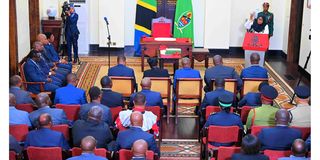Prime
Serving at the pleasure of the President

President Samia swears in newly appointed officials at State House, Dar es Salaam, on Tuesday, September 26, 2023. PHOTO | STATE HOUSE
What you need to know:
- These appointments are never only about delivering the best to the country.
Presidential appointments are part and parcel of our administrative and political culture.
In our bat-like system, where there are many instances of difficulties in discerning the line that separates the State and the ruling party, some appointments in the party feel like other presidential appointments.
What is it about serving at the pleasure of the President that keeps the country hooked on these appointments?
Thomas Jefferson, a former American president, once remarked, “There is nothing I am so anxious about as good nominations, conscious that the merit as well as the reputation of an administration depends as much on that as on its measures."
In our context, where presidents have never had any constitutional or legal restrictions placed on them in their appointments, except for one post, the stark reality is that aspects of check and balance are non-existent.
Some appointments are more consequential than others. Inevitably, this leads to questions about the impartiality of appointees who could easily be swapped or moved from government to party and party to government.
Will a regional commissioner who is appointed while serving in the ruling party be perceived as impartial and fair to those who do not share his or her political leanings?
Is such an appointment a promotion or demotion?
Presidential appointments have also generated huge debates at times, depending on the quality and competence of the appointees.
There have been times when the debates and controversy generated by some of the names on the list of those who have made it have led to a reversal of their appointments.
Some appointees have had the worst luck in that their appointments are reversed within hours or days before they are sworn in, leaving them stuck in the middle of ‘nowhere’.
These reversals within very short periods are more reflective of the appointing authority than they are of the appointees.
They are also reflective of the shadowy ‘godfathers’ and ‘godmothers’ behind the scenes who influence presidential appointments one way or another.
President Samia Suluhu Hassan has spoken several times about the role played by these figures behind the curtain.
While the Constitution and other laws vest in the President the powers of appointments, political reality dictates that such powers are 'shared' and that is reflected on the list of presidential appointments.
It is for such reasons that a list of appointments may come out peppered with a long list of individuals who lost out in national elections or party primaries.
These appointments are never only about delivering the best to the country; they are just as well about keeping the political temperatures within the ruling party relatively low.
Opposition troublemakers have been brought into the political fold through these appointments as well.
Then there are those who have delivered in the private sector but do not replicate their abilities in government after a presidential appointment.
What makes such accomplished individuals venture into the wilderness of political appointments?
Is it about their sense of service to their country?
Is it about their sense of challenge to tame the beast that is public bureaucracy?
Is it about a sense of respect for the appointing authority?
After all, these appointments are rarely rejected by the appointees.
In recent years, only three individuals are publicly known to have turned down such appointments.
Did they fail to take into account the political circumstances behind presidential appointments?
Either way, many of the individuals who were screaming for success in the private sector have failed to deliver in government.
Presidential appointments are not always about service to the people.
However, these appointments are critical to delivering on key aspects of the president’s goals and targets.
The focus is rarely on the technical aspects of these appointments, with the political implications taking the lion’s share of consideration.
Without checks and balances, serving at the pleasure of the President means there are plenty of revolving doors and many insecure individuals going through those doors at each end.





